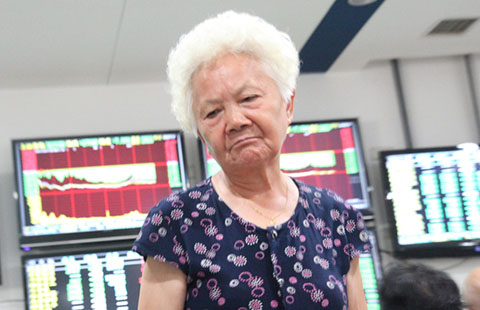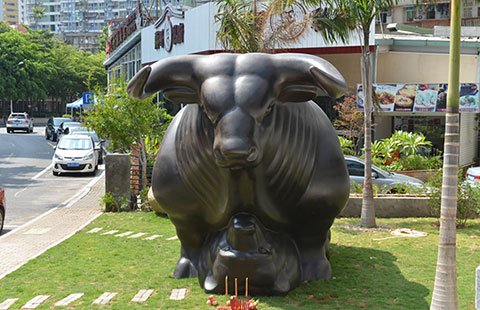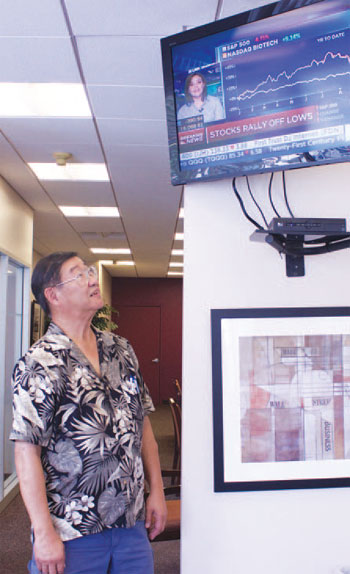Investors in for long haul amid selloff
Updated: 2015-08-25 11:08
By Paul Welitzkin in New York(China Daily USA)
|
||||||||
|
Dennis Tom watches US stock market returns at a Scottrade office on Monday in Flushing, Queens, New York. Tom intends to keep his stock investments despite the selloff. Hong Xiao / China Daily |
Chinese stocks lead massive selling in global markets
Stock market investors in China and the United States appear ready to maintain their holdings despite the latest selloff on Monday as concern over the Chinese economy and slumping oil prices battered equities around the world.
In the US, the Dow Jones Industrial Average, which fell more than 1,000 points at the opening bell, regained some footing and finished the day down 588.47, or 3.58 percent, at 15,871.28.
Chinese stocks plunged by more than 8.5 percent on Monday, the largest one-day percentage loss since 2007. The Shanghai Stock Exchange A Share Index lost 311.89 to close at 3,362.93. The Shenzhen Stock Exchange A Share index lost 162.26 to close at 1,969.46.
The largest US-listed exchange-traded funds tracking yuan-denominated equities fell the most on record amid questions over the government's ability to support a flagging economy.
On the Shanghai Composite, more than 800 stocks fell by the daily 10 percent limit. The ETF selloff may indicate investors expect further weakness in the A-share market, according to Ankur Patel of R-Squared Macro Management told Bloomberg.
"In Chinese mainland, the stocks would have sold off more had there not been a daily 10 percent limit in place," Patel, chief investment officer at the Birmingham, Alabama-based firm, said by phone. "You may see an additional selloff from here on if the ... ETF is an indicator for that."
A Bloomberg gauge of the most-traded Chinese companies listed in the US sank 5.7 percent to trade at a 17-month low as Internet firms from Baidu Inc to Weibo Corp plunged.
"It's a big correction going on right now," said Dennis Tom, 67, who watched market reports in the Scottrade office in Flushing, Queens. "They are waiting for oil prices to bottom out."
Tom is retired and depends on dividends from stocks to supplement his retirement income. "I have good-quality stocks like AT&T, BP and Exxon. So I am in this for a while."
Tom said the selloff this year in China represents the first time most investors on the mainland have had to deal with a downturn.
"China is like the new guy on the block," he said. "Mostly because of Alibaba, China had over 19 million get into the market for the first time in the last year. They too will learn that what goes up must also come down at some point."
Jin Zheng and his wife were visiting Flushing from Fujian province in China. They are invested in mainland-listed stocks. Despite the recent market turbulence, the Zhengs remain committed to their portfolio.
"I am not that worried," Jin said. "I think this is mainly a temporary situation."
"We try not to let it affect us and are still hopeful for the future because China's national power is growing," added his wife.
A man who identified himself as Mr Yu said he is 80 years old and is a retired engineer from Anhui province in China. He lives in Flushing with his children, having arrived in the US three years ago.
"I don't think the Chinese market has much hope right now," he said. "However, most Chinese have some savings, so I think many will survive the current market."
Yu said he owns some stocks in the US. "I look at the US market as a benchmark. Even if it is down, it will be down less than the market in China," he said.
Randy Chow is the agency managing director for the Massachusetts Mutual Life Insurance Co office in Flushing. Mass Mutual doesn't sell stocks directly to consumers but does provide products like annuities, which may contain stock mutual funds.
"Most of our clients are either first- or second-generation Chinese, so they are looking at safety when making an investment," Chow said. "That's why many of them decide to purchase life insurance as a wealth-accumulation tool."
Chow said he was answering calls from some clients who owned annuities with stock funds.
Hong Xiao in New York contributed to this story.
paulwelitzkin@chinadailyusa.com
- Turkey to hold snap parliamentary election
- Caroline Kennedy used personal email for official business
- Czech appeals for closing Schengen external border
- DPRK says inter-Korean contact gives lesson to South Korea
- Trial starts for Chinese scholar expelled from Norway
- Britain to crack down illegal working

 Chinese long jumpers leap to history
Chinese long jumpers leap to history
 Female honor guards train for military parade debut
Female honor guards train for military parade debut
 Top 10 richest universities in China
Top 10 richest universities in China
 The looks of despair in Chinese stock market
The looks of despair in Chinese stock market
 Goodbyes and tears as left-behind children head home
Goodbyes and tears as left-behind children head home
 Bull crushes bear in stock market statue
Bull crushes bear in stock market statue
 Top 10 emerging cities on the Chinese mainland
Top 10 emerging cities on the Chinese mainland
 Jamaican Fraser-Pryce again becomes world champion
Jamaican Fraser-Pryce again becomes world champion
Most Viewed
Editor's Picks

|

|

|

|

|

|
Today's Top News
Bank lowers lending rate to ease debts
Officials on suspended death sentence face life behind bars
US National Security Adviser Rice to visit Beijing this weekend
Warner Bros plans to develop Chinese-language movies
Central bank announces rate cut to bolster real economy
Investors in for long haul amid selloff
30 heads of state to attend China's Victory Day celebrations
ROK, DPRK agree to defuse tension
US Weekly

|

|






